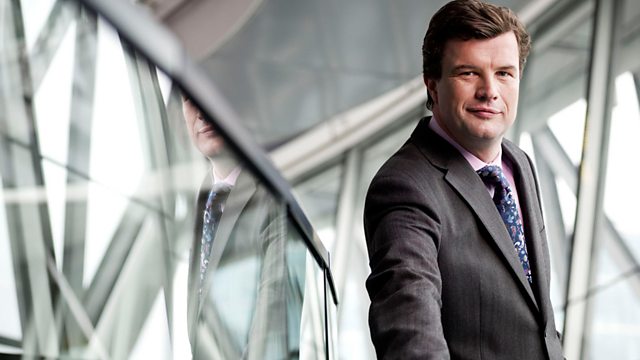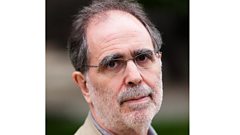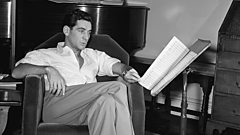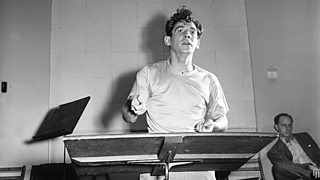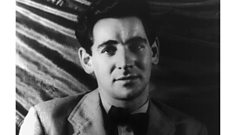The Leonard Bernstein Letters, Joshua Rifkin, Andrew Carnegie
Presented by Petroc Trelawny. Including a review of The Leonard Bernstein Letters, a revealing new collection of the conductor-composer's correspondence edited by Nigel Simeone.
With Petroc Trelawny.
Including a review of The Leonard Bernstein Letters, edited by Nigel Simeone. This new collection of letters presents a revealing selection of exchanges between Bernstein and a wide range of correspondents including Aaron Copland, Bette Davis and Jerome Robbins, as well as his family. Petroc talks to Simeone, and is joined to review it by the American conductor and producer John Mauceri, a protege of Bernstein's, and the writer and broadcaster Edward Seckerson.
Liz Mcdonald tells the story of the Scots-American philanthropist Andrew Carnegie, who died in 1919 leaving a musical legacy including over 7,000 church organs, and 3000 libraries and music halls.
Petroc catches up with Anne Midgette of the Washington Post about some of the current top music stories in the US, from the Minnesota Orchestra to New York's mayoral elections.
And Joshua Rifkin, whose career as a pianist and academic has spanned Renaissance motets to ragtime masters, talks to Petroc about the music of Scott Joplin, growing up amongst the modernists of New York, and his now influential theory that most of Bach's choral works were sung with only one singer per part, an idea widely rejected when Rifkin first proposed it in the 1980s.
Last on
More episodes
Previous
Clips
Chapters
-
The Letters of Leonard Bernstein
Duration: 18:11
The musical legacy of Andrew Carnegie
Duration: 08:23
Anne Midgette with the latest US Arts News
Duration: 06:00
Joshua Rifkin talks about Joplin, Bach and Stockhausen
Duration: 10:25
The Letters of Leonard Bernstein
![The Letters of Leonard Bernstein]()
The charismatic and versatile American conductor and composer Leonard Bernstein was a prolific writer of letters throughout his life β tens of thousands of them being held at Washingtonβs Library of Congress. A newly published collection of 650 of the letters presents a revealing selection of exchanges between Bernstein and a wide range of correspondents including Aaron Copland, Bette Davis and Jerome Robbins as well as his family. Petroc Trelawny talks to Nigel Simeone who has edited this collection and is joined to review it by the American conductor John Mauceri, a protΓ©gΓ© of Bernstein's, and the writer and broadcaster Edward Seckerson.Μύ Michael Brandon reads a selection of the letters.
Photo: William P. Gottlieb
More information:
The Musical Legacy of Andrew Carnegie
![The Musical Legacy of Andrew Carnegie]()
Who was the man behind Carnegie Hall? Andrew Carnegie was a Scot by birth, raised in a weaverβs cottage in Dunfermline before he and his family went to America, where Carnegie was to make his fortune in steel and the railways. He died in 1919 leaving a musical legacy including over 7,000 church organs and 3000 libraries and music halls, including the infamous Carnegie Hall in New York. Liz Macdonald from the Carnegie Trust UK tells the story of Carnegie the man,Μύ and the work which continues in his name today.Μύ Robert Bowles, organist of The Church of the Holy Spirit, Clapham, demonstrates one of the few remaining working organs built with generous help form CarnegieΜύ
More information:
Musical America Today
![Musical America Today]()
Even before the recent American Government Shutdown the classical music world in the United States was going through a turbulent time Petroc talks to Anne Midgette, Music Critic of The Washington Post about some of the current top music stories in the US - from the Minnesota Orchestra to New York's mayoral elections and orchestral musicians who have taken the unprecedented action of withdrawing from their trade union.
Μύ
More information:
Μύ
ΜύJoshua Rifkin
![Joshua Rifkin]()
Joshua Rifkin, whose career as a pianist and academic has spanned Renaissance motets to ragtime masters, talks to Petroc about reviving the music of Scott Joplin, growing up amongst the modernists of New York, studying with Stockhausen in Germany and his now influential theory that most of Bach's choral works were sung with only one singer per part, an idea widely rejected when Rifkin first proposed it in the 1980s.ΜύΜύ
Photo: Jan Kobel
More information:
Credits
Role Contributor Presenter Petroc Trelawny Interviewed Guest Nigel Simeone Interviewed Guest John Mauceri Interviewed Guest Edward Seckerson Interviewed Guest Liz McDonald Interviewed Guest Anne Midgette Interviewed Guest Joshua Rifkin Broadcast
- Sat 2 Nov 2013 12:15ΒιΆΉΤΌΕΔ Radio 3
Featured in...
![]()
Bernstein 100—ΒιΆΉΤΌΕΔ Proms
A collection of programmes to mark the centenary of the birth of Leonard Bernstein.
Knock on wood β six stunning wooden concert halls around the world
Steel and concrete can't beat good old wood to produce the best sounds for music.
The evolution of video game music
Tom Service traces the rise of an exciting new genre, from bleeps to responsive scores.
Why music can literally make us lose track of time
Try our psychoacoustic experiment to see how tempo can affect your timekeeping abilities.
Podcast
-
![]()
Music Matters
The stories that matter, the people that matter, the music that matters
